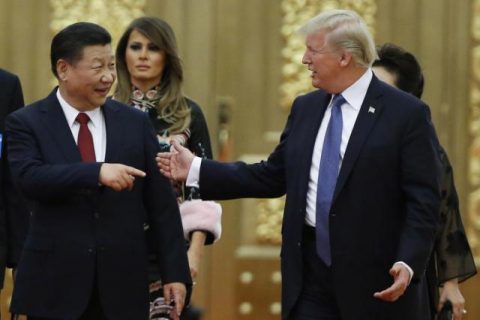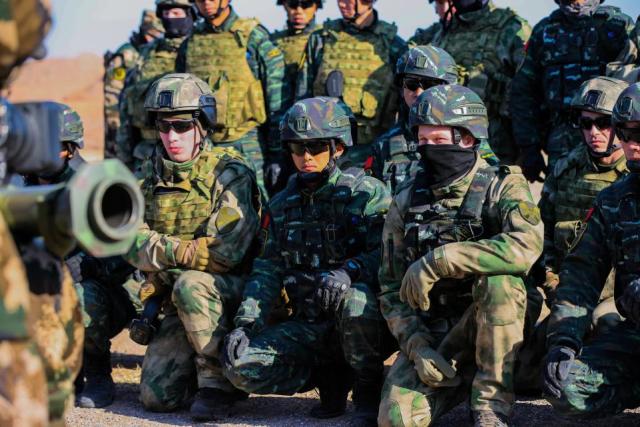
China Says U.S. Debate Over Trump’s Mental Health Shows Democracy Is Dying
China’s ruling Communist Party has weighed in on the national debate spurred by a recent controversial book alleging links between President Donald Trump’s decision-making and his mental health, saying the debacle may actually be a commentary on the state of U.S. democracy as a whole.
In the record-shattering exposé Fire and Fury: Inside the Trump White House, which was released Friday, author Michael Wolff reportedly compiled more than 200 interviews with White House insiders, many of whom were deeply critical of Trump and some of whom asserted that the Republican leader was not mentally fit to hold the country’s top office. Trump immediately took to social media to defend himself against claims made by his former staffers and Wolff—who himself had choice words for the commander in chief—by asserting he was “a very stable genius.” But the official organ of China’s top political party observed a situation in the U.S. that appeared to be anything but stable.
Related: China tells Trump “This is not how a U.S. president should behave” after North Korea tweet
“Although since World War II U.S. presidents have often come under attack, Trump is the first to have his mental health questioned. This shows the waning quality of U.S. democratic politics,” Global Times wrote in one of its latest editorials.
Rather than take sides in the debate, the Chinese Communist Party newspaper saw the whole affair as indicative of fundamental problems within the U.S. political system. The article credited Trump’s “erratic style” and “mental peculiarities” with getting him elected in the first place and criticized those who called his supporters “deplorables,” a term coined by Democratic presidential hopeful Hillary Clinton two months before the election in which she was defeated.
The publication even claimed Trump had achieved more in his roughly one year in office than those who came before him. As an example, it referenced Trump’s historic decisions to declare Jerusalem the capital of Israel, a move that earned him worldwide scorn and that the Chinese outlet said would have been “unthinkable for his predecessors.”
Don’t miss: Who is Flirtaus? BTS Fan Creates Outcast, a Horror-Themed AU, and Thread Goes Viral
“Many of his actions can be taken as either reforms against dissenting views or mentally ill behavior, depending on one’s perspective,” the editorial argued.
China has criticized Trump’s behavior in the past, especially in relation to his handling of the nuclear crisis with neighboring North Korea. China also opposed North Korean supreme leader Kim Jong Un’s development of ballistic and nuclear weapons, but saw Trump’s combative approach to the situation as detrimental to potential peace talks that both Beijing and Moscow have attempted to push. The title of Wolff’s book was inspired by an August statement in which Trump told reporters that North Korea would be “met with fire and fury like the world has never seen” if it kept threatening the U.S.
Both China and Russia have become increasingly close as they challenge the U.S. on a global scale. They have engaged in joint military drills said designed to respond to a potential U.S. invasion of North Korea.
Most popular: Singing With Your Baby Can Help New Moms Recover Faster From Postnatal Depression
China was a frequent target of Trump during his presidential campaign, during which he accused the U.S.’s top economic competitor with stealing jobs and practicing currency manipulation. Trump also targeted Beijing in the National Security Strategy unveiled last month and promised to make “America First,” but China accused the U.S. of distorting its global interests and of bearing a “Cold War mentality.”
Less than a month later, the Global Times said Sunday that China and other nations were glad to see the explosive contents of Wolff’s book and the resulting clashes of the president’s supporters and detractors because it made the U.S. look bad. The nationalist newspaper warned, however, that the “demonic possession” of U.S. democracy should serve as a lesson to empower its own, one-party system.
“It is doubtful whether the U.S. public likes to see this happen to their president. But the outside world certainly welcomes such a farce. Questioning the mental health of an elected U.S. president satirizes not only the institution but the U.S. electoral system itself,” the editorial read.
“As onlookers, we find that there are big problems with the U.S. political system from which we should steer well clear,” it added.
At home, a highly publicized study by Harvard University lecturer Yascha Mounk and Roberto Stefan Foa, a political scientist at the University of Melbourne in Australia, showed massive drops in support for democracy among millennials in the West, and especially in the U.S., as detailed in an analysis they wrote last month for The Washington Post.







